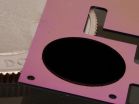(Press-News.org) Supplementing children's diets with fish oil, enrolling them in quality preschool, and engaging them in interactive reading all turn out to be effective ways to raise a young child's intelligence, according to a new report published in Perspectives on Psychological Science, a journal of the Association for Psychological Science.
Using a technique called meta-analysis, a team led by John Protzko, a doctoral student at the NYU Steinhardt School of Culture, Education, and Human Development, combined the findings from existing studies to evaluate the overall effectiveness of each type of intervention. In collaboration with NYU Steinhardt professors Joshua Aronson and Clancy Blair, leaders in the field of intelligence, Protzko analyzed the best available studies involving samples of children from birth and kindergarten from their newlyassembled "Database of Raising Intelligence."
"Our aim in creating this database is to learn what works and what doesn't work to raise people's intelligence," said Protzko. "For too long, findings have been disconnected and scattered throughout a wide variety of journals. The broad consensus about what works is founded on only two or three very high-profile studies."
All of the studies in this database rely on a normal population (participants without clinical diagnoses of intellectual disabilities), focus on interventions that are sustained over time, use widely accepted measures of intelligence, and, most importantly, are randomly controlled trials (participants selected at random to receive one of the interventions).
"The larger goal here is to understand the nature of intelligence, and if and how it can be nurtured at every stage of development," said Aronson, Protzko's advisor. "This is just a first step in a long process of understanding. It is by no means the last word. In fact, one of the main conclusions is how little high quality research exists in the field and how much more needs to be done."
Overall, the results of the meta-analyses indicated that certain dietary and environmental interventions can be effective in raising children's IQ.
Supplementing pregnant women and newborns with long-chain polyunsaturated fatty acids, foods rich in Omega-3, were found to boost children's IQ by more than 3.5 points. These essential fatty acids may help raise intelligence by providing the building blocks for nerve cell development that the body cannot produce on its own.
There is insufficient research, however, to determine whether other types of supplements — including iron, B-complex vitamins, riboflavin, thiamine, niacin, and zinc — have beneficial effects on intelligence.
Enrolling an economically disadvantaged child into an early education intervention was found to raise his or her IQ by more than four points; interventions that specifically included a center-based education component raised a child's IQ by more than seven points.
The researchers hypothesize that early education interventions may help to raise children's IQ by increasing their exposure to complex environments that are cognitively stimulating and demanding. It's not clear, however, whether these results apply more broadly to kids from different socioeconomic backgrounds.
Surprisingly, Protzko, Aronson, and Blair found no evidence to support the idea that early education interventions that take place earlier in childhood are more effective than those that begin later.
Interventions focused on interactive reading — teaching parents how to engage their children while reading with them — were found to raise children's IQ by over 6 points. These interventions do not seem to have an effect for children over 4 years old, suggesting that the interventions may accelerate language development, which, in turn, boosts IQ.
Sending a child to preschool was found to raise his or her IQ by more than four points, and preschools that include a language development component were found to boost IQ by more than seven points. The link between preschool and intelligence could be a function of increased exposure to language or the result of the overall cognitive complexity of the preschool environment.
"Our current findings strengthen earlier conclusions that complex environments build intelligence, but do cast doubt on others, including evidence that earlier interventions are always most effective," Protzko explained. "Overall, identifying the link between essential fatty acids and intelligence gives rise to tantalizing new questions for future research and we look forward to exploring this finding."
###
For more information about this study, please contact: John Protzko at protzko@gmail.com.
Perspectives on Psychological Science is ranked among the top 10 general psychology journals for impact by the Institute for Scientific Information. It publishes an eclectic mix of thought-provoking articles on the latest important advances in psychology. For a copy of the article "How to Make a Young Child Smarter: Evidence From the Database of Raising Intelligence" and access to other Perspectives on Psychological Science research findings, please contact Anna Mikulak. END
Diet, parental behavior, and preschool can boost children's IQ
2013-01-25
ELSE PRESS RELEASES FROM THIS DATE:
Black silicon can take efficiency of solar cells to new levels
2013-01-25
This press release is available in German.
Scientists at Aalto University, Finland, have demonstrated results that show a huge improvement in the light absorption and the surface passivation on highly absorbing silicon nanostructures. This has been achieved by applying atomic layer coating. The results advance the development of devices that require high sensitivity light response such as high efficiency solar cells.
This method provides extremely good surface passivation. Simultaneously, it reduces the reflectance further at all wavelengths. These results are ...
DNA and quantum dots: All that glitters is not gold
2013-01-25
A team of researchers at the National Institute of Standards and Technology (NIST) has shown that by bringing gold nanoparticles close to the dots and using a DNA template to control the distances, the intensity of a quantum dot's fluorescence can be predictably increased or decreased.* This breakthrough opens a potential path to using quantum dots as a component in better photodetectors, chemical sensors and nanoscale lasers.
Anyone who has tried to tune a radio knows that moving their hands toward or away from the antenna can improve or ruin the reception. Although ...
More than 1 brain behind E=mc2
2013-01-25
Two American physicists outline the role played by Austrian physicist Friedrich Hasenöhrl in establishing the proportionality between the energy (E) of a quantity of matter with its mass (m) in a cavity filled with radiation. In a paper about to be published in EPJ H, Stephen Boughn from Haverford College in Pensylvannia and Tony Rothman from Princeton University in New Jersey argue how Hasenöhrl's work, for which he now receives little credit, may have contributed to the famous equation E=mc2.
According to science philosopher Thomas Kuhn, the nature of scientific progress ...
National Cancer Centre Singapore scientists discover p53 mutation hinders cancer treatment response
2013-01-25
Reducing the level of mutant p53 gene increases susceptibility to treatment
Scientists from the National Cancer Centre Singapore (NCCS) have discovered the workings of the gene that has been hindering treatment response in cancer patients. This discovery was made after 5 years of studying the mutant form of the p53 gene, the major tumor suppressor in humans, which is generally found mutated in over 50% of all type of human cancers.
The dominant-negative (DN) effect of the mutant p53 gene in cancers was found to affect the outcome of cancer treatment modalities. DN effect ...
Evolution inspires more efficient solar cell design
2013-01-25
The sun's energy is virtually limitless, but harnessing its electricity with today's single-crystal silicon solar cells is extremely expensive — 10 times pricier than coal, according to some estimates. Organic solar cells — polymer solar cells that use organic materials to absorb light and convert it into electricity — could be a solution, but current designs suffer because polymers have less-than-optimal electrical properties.
Researchers at Northwestern University have now developed a new design for organic solar cells that could lead to more efficient, less expensive ...
Quantum communication: Each photon counts
2013-01-25
This press release is available in German.
The detector combines near-unity detection efficiency with high timing resolution and has a very low error rate. The results have been published by Nature Communications (doi:10.1038/ncomms2307).
Ultrafast, efficient, and reliable single-photon detectors are among the most sought-after components in photonics and quantum communication, which have not yet reached maturity for practical application. Physicist Dr. Wolfram Pernice of the Karlsruhe Institute of Technology (KIT), in cooperation with colleagues at Yale University, ...
NIST's 'nanotubes on a chip' may simplify optical power measurements
2013-01-25
The National Institute of Standards and Technology (NIST) has demonstrated a novel chip-scale instrument made of carbon nanotubes that may simplify absolute measurements of laser power, especially the light signals transmitted by optical fibers in telecommunications networks.
The prototype device, a miniature version of an instrument called a cryogenic radiometer, is a silicon chip topped with circular mats of carbon nanotubes standing on end.* The mini-radiometer builds on NIST's previous work using nanotubes, the world's darkest known substance, to make an ultraefficient, ...
Analysis of Greenland ice cores adds to historical record and provide glimpse into climate's future
2013-01-25
A new study that provides surprising details on changes in Earth's climate from more than 100,000 years ago indicates that the last interglacial--the period between "ice ages"--was warmer than previously thought and may be a good analog for future climate, as greenhouse gases increase in the atmosphere and global temperatures rise.
The research findings also indicate that melting of the massive West Antarctic ice sheet may have contributed more to sea-level rise at that time than melting of the Greenland ice sheet.
The new results from the North Greenland Eemian Ice ...
Emotional stress reduces effectiveness of prostate cancer therapies in animal model
2013-01-25
WINSTON-SALEM, N.C. – Jan. 25, 2013 – Not surprisingly, a cancer diagnosis creates stress. And patients with prostate cancer show higher levels of anxiety compared to other cancer patients.
A new study by researchers at Wake Forest Baptist Medical Center indicates that stress is not just an emotional side effect of the diagnosis; it also can reduce the effectiveness of prostate cancer drugs and accelerate the development of prostate cancer.
The findings are published in the February issue of the Journal of Clinical Investigation.
The Wake Forest Baptist team, headed ...
INRS develops a nanohybrid with remarkable properties using a new laser-plasma process
2013-01-25
Montreal, January 25, 2013 – By achieving the synthesis of a novel nanohybrid structure by means of the pulsed laser ablation (PLA) technique, Professor My Ali El Khakani and his team paved the way for a new generation of optoelectronic materials. The combination of carbon nanotubes and lead sulfide (PbS) nanoparticles was performed using an effective and relatively simple process that offers considerable latitude for creating other nanohybrids for a variety of applications. The INRS Énergie Matériaux Télécommunications Research Centre researcher's work, published in the ...



